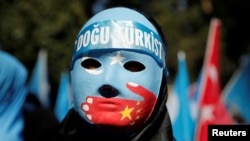October 27 is International Religious Freedom Day and marks the passage of the 1998 International Religious Freedom Act by the U.S. Congress. Secretary of State Mike Pompeo has underscored that the legislation “expanded U.S. foreign policy capabilities to promote and defend religious freedom around the world.”
President Donald Trump recently hosted the first-ever dialogue at the United Nations on religious freedom. There he observed that most people around the globe are people of faith. And yet, in 80 percent of the countries in the world, people are prevented from fully being able to practice their faith.
In a recent interview, USAID Deputy Administrator Bonnie Glick highlighted some of the world’s worst abusers of religious freedom. They include the Burmese regime’s treatment of the Rohingya Muslims and the Chinese Communist government’s oppression of the Uighurs:
“The cruelty of the Burmese government being unwilling to allow Muslims to practice their faith, but also to gather them up and segregate them out from the rest of the population, is something that to our mind in the United States is a horrible offense. We’re seeing as well in China that the Chinese have rounded up a million Uighur Muslims and they are not allowing them to leave labor camps of some sort.”
Elsewhere, in Iraq, Christian and Yazidi communities have suffered severe persecution at the hand of ISIS, said Deputy Administrator Glick:
”To date, the United States has committed nearly $400 million to the rebuilding of communities that were decimated by ISIS. We’re working with the local communities in the Ninevah Plains and in western Nineveh province to allow those communities, Christians and Yazidis, to return to their historic homes.”
United States foreign policy will continue to support and defend the right of all people to freedom of religion. As Secretary Pompeo has made clear, “The freedom of individuals to believe as they see fit is a God-given right that is central to the success of a nation.”






